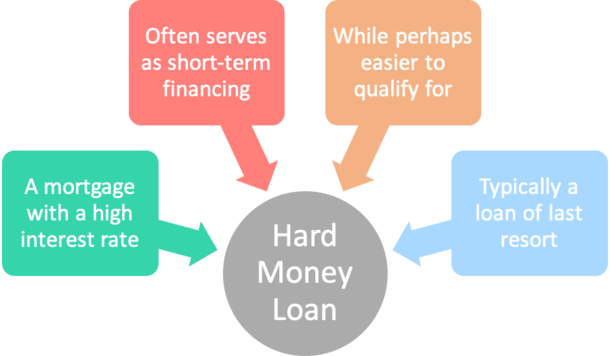How Georgia hard money lenders Support Investors with Poor Credit
The Function of Hard Money Loans in Real Estate Deals: What You Need to Know
Difficult money finances are a crucial funding device in genuine estate transactions. They provide investors fast access to resources, especially in immediate circumstances. Secured by real estate, these lendings concentrate on property worth as opposed to the customer's credit report. They come with remarkable dangers and prices. Understanding the nuances of tough cash financings is necessary for anyone looking to navigate this complicated financial landscape successfully. What aspects should capitalists think about before continuing?
What Are Hard Money Finances?
Difficult cash finances act as an important funding option in property deals, particularly for financiers looking for fast access to capital. Unlike standard car loans, hard cash lendings are protected by actual home and are mainly based upon the worth of the asset rather than the customer's credit reliability. These fundings are commonly offered by private loan providers or financiers, enabling customers to bypass prolonged approval procedures associated with standard funding.
Tough cash financings are commonly short-term services, with settlement durations varying from a few months to a few years. As a result of their expedited nature, they are preferred amongst property fins and those requiring instant funds for home acquisition or recovery. Rate of interest for tough money lendings have a tendency to be more than traditional lendings, reflecting the increased risk lending institutions take on. Generally, hard money financings accomplish an important function in the genuine estate market, providing to those who call for versatility and rate in their funding alternatives.
Advantages of Hard Cash Loans
While traditional funding can be slow and troublesome, tough money financings use a number of unique benefits that appeal to actual estate financiers. One key benefit is the rate of the financing procedure; financings can commonly be authorized and funded within days, enabling investors to seize opportunities swiftly. This fast turnaround is specifically useful in open markets where time is of the essence.
In addition, difficult money finances are mainly asset-based rather than credit-based, meaning that investors with less-than-perfect credit rating can still protect funding. This availability makes it possible for a broader series of financiers to participate in property purchases.
Additionally, difficult money lending institutions generally have extra adaptable conditions contrasted to traditional loan providers, enabling tailored repayment strategies customized to private task requirements. This adaptability can enhance a capitalist's ability to manage cash flow efficiently during remodelling or resale phases. Generally, these advantages make hard money finances a compelling option for several property endeavors.
Possible Drawbacks to Consider
While tough money car loans can provide fast financing, possible drawbacks call for careful consideration. Debtors commonly face higher rate of interest compared to standard financing, which can increase general expenses. In addition, the shorter payment terms may pressure borrowers to safeguard refinancing or offer the property quicker than prepared for.
Higher Rates Of Interest
Higher rate of interest represent a considerable consideration in difficult money loans, specifically in genuine estate transactions. These loans typically feature rates that are considerably more than standard financing choices, frequently ranging from 8% to 15%. This elevated expense can influence the overall profitability of a realty financial investment, as borrowers might find themselves alloting a bigger part of their budget plan to passion settlements. Furthermore, the high prices can create difficulties for financiers looking for to utilize their capital efficiently. For those that are not gotten ready for these monetary implications, the problem of high-interest repayments can cause capital concerns, ultimately influencing the success of the property financial investment. Recognizing the implications of higher rate of interest prices is essential for potential customers.
Shorter Settlement Terms
Shorter repayment terms are a specifying attribute of tough cash fundings, which can present numerous obstacles for consumers. Typically varying from 6 months to three years, these terms call for debtors to pay off the loan quickly, typically causing monetary strain. The pressure to create returns within a minimal timeframe can push debtors to rush residential or commercial property restorations or sales, potentially jeopardizing the high quality of the financial investment. Additionally, the requirement of a speedy departure technique may restrict options for refinancing or selling, resulting in higher threats. Debtors need to carefully consider their monetary capacities and market problems to stay clear of skipping on these lendings, which can bring about the loss of the collateralized building.
Just How Hard Cash Car Loans Function
Difficult cash fundings operate through a special framework that prioritizes property value over creditworthiness. The authorization process is generally swift, permitting borrowers to gain access to funds rapidly contrasted to traditional financing. In addition, an exam of passion rates discloses that hard cash loans typically bring greater prices, mirroring the boosted risk taken by lenders.
Lending Framework Clarified

In property transactions, recognizing the framework of difficult money lendings is essential for financiers seeking fast funding. Tough money fundings are typically secured by property, with the residential property serving as collateral. These fundings generally entail greater rate of interest rates compared to typical financing, mirroring the boosted danger taken by loan providers. The car loan terms are usually short, usually varying from six months to three years, promoting quick access to get more info funding. Loan amounts can vary significantly, often relying on the property's value as opposed to the customer's credit reliability. Investors take advantage of the expedited approval process, enabling them to seize investment chances without delay. In general, the framework of difficult cash loans satisfies those requiring fast, adaptable funding alternatives in property markets.
Approval Process Summary
The authorization process for hard cash lendings is distinct from conventional financing methods, primarily concentrating on the security instead than the debtor's credit account. Lenders assess the worth of the residential or commercial property being utilized as collateral, guaranteeing it fulfills their standards for threat analysis. When a residential or commercial property is determined, consumers submit a car loan application that consists of details concerning the building and the meant use of funds (Georgia hard money lenders). The loan provider conducts a quick appraisal and might need additional documents, however the process is commonly quickened compared to standard car loans. Authorization commonly happens within days, allowing borrowers to access funds rapidly. This streamlined technique is beneficial for actual estate capitalists seeking quick financing options for procurement or improvement projects
Passion Prices Contrast
While tough money lendings provide quick accessibility to funds, their rates of interest are typically more than those of standard home mortgages. Consumers can expect rates ranging from 8% to 15%, depending upon the loan provider and the specifics of the deal. In comparison, traditional home loan prices typically fall between 3% and 6%. The greater prices related to difficult money fundings reflect the enhanced risk lenders take, as these finances are typically safeguarded by the residential property itself as opposed to the consumer's credit reliability. This indicates that while hard cash lendings can help with quick financing genuine estate investments, they can also result in substantially higher expenses in time, making it necessary for customers to meticulously assess their economic situation prior to proceeding.
When to Make Use Of Tough Money Finances
When is it sensible to contemplate hard cash car loans in genuine estate purchases? Capitalists frequently consider these loans in circumstances where conventional financing is either inaccessible or unwise. Hard cash car loans can be beneficial for residential properties calling for fast purchase, such as foreclosure public auctions or troubled properties needing immediate remodellings.
Furthermore, genuine estate financiers seeking to take advantage of time-sensitive opportunities, like flipping residences, may discover difficult cash fundings useful due to their expedited authorization procedure. Consumers with less-than-perfect credit or unconventional residential or commercial properties might also decide for tough cash funding, as loan providers primarily concentrate on the home's worth instead than the debtor's monetary history.
Tips for Selecting a Tough Money Lender
Exactly how can financiers ensure they select the ideal tough cash lender for their realty demands? Detailed research is vital. Capitalists ought to assess prospective lending institutions by examining their client, experience, and reputation testimonials. It is advisable to look for out lenders that specialize in the sort of home being financed, as this can improve the possibility of beneficial terms.
Next off, understanding the lending institution's conditions and terms is significant. Financiers must ask about rate of interest rates, fees, and repayment timetables. Transparent interaction is essential; lenders ought to be prepared to make clear any kind of uncertainties.
Furthermore, examining the lending institution's funding speed and adaptability can be valuable, especially in open markets. Capitalists should also think about developing a rapport with the lender, as an excellent partnership can facilitate smoother transactions. Lastly, consulting market experts or realty agents can provide additional understandings and suggestions, making sure a knowledgeable decision.
Often Asked Concerns
Can Hard Cash Loans Be Utilized for Business Characteristics?
Difficult money finances can without a doubt be made use of for industrial properties, offering fast financing options for capitalists - Georgia hard money lenders. These financings are commonly safeguarded by the residential or commercial property itself, allowing debtors to gain access to funds without conventional loaning requirements
What Is the Regular Loan-To-Value Proportion for Hard Money Loans?
The common loan-to-value proportion for tough money lendings normally ranges from 60% to 75%. This ratio varies based on the home type, lender plans, and individual borrower situations, showing the greater threat connected with these fundings.
Are Difficult Cash Finances Offered to Novice Property Buyers?
Tough cash finances can be obtainable to novice property buyers, though terms differ by loan provider. These loans typically have higher rate of interest and shorter repayment periods, making them a less standard choice for new purchasers.
Just How Rapidly Can I Shut on a Tough Money Finance?
The rate of shutting on a difficult money financing can differ, however typically it ranges from a couple of days to a number of weeks, depending on the lending institution's needs and the debtor's economic situation. (Georgia hard money lenders)
What Files Are Needed to Look For a Tough Cash Funding?

Unlike standard lendings, hard cash financings are secured by real residential property and are largely based on the value of the asset instead than the borrower's credit reliability. Rate of interest prices for tough money finances have a tendency to be greater than typical financings, reflecting the enhanced danger loan providers embark on. The authorization procedure for tough money fundings is distinct from typical loaning approaches, largely concentrating on the collateral rather than the customer's credit rating profile. The higher rates associated with difficult money lendings show the raised risk lending institutions take, as these financings are usually protected by the property itself rather than the borrower's credit reliability. To use for a hard money funding, consumers normally require to provide home info, a loan application, evidence of revenue, credit history, and recognition.